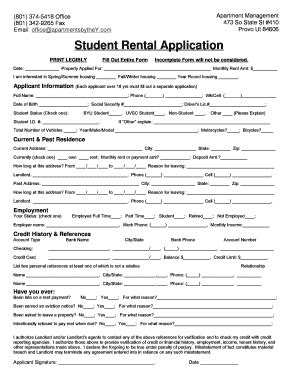Finding off-campus student housing can be a daunting task. From navigating the competitive rental market to understanding lease agreements, the process can be overwhelming. This comprehensive guide will provide you with all the information you need to successfully navigate the students rental application process.

Research and Planning
1. Determine Your Budget and Needs
Start by determining your budget, including rent, utilities, and any additional fees. Consider your income and living expenses to ensure you can afford the rental. Make a list of your must-have amenities, such as a certain number of bedrooms, bathrooms, and parking availability.
2. Location and Transportation
Research different neighborhoods to find an area that meets your lifestyle and needs. Consider factors such as proximity to campus, public transportation, and nightlife. Check public transportation schedules and routes to ensure convenience for getting around.
3. Find Potential Rentals
Explore various rental websites, such as Zillow, Trulia, and Craigslist. Contact listing agents and landlords to inquire about availability and schedule viewings. Attend open houses to get a firsthand look at the properties.
Application Process
1. Gather Required Documents
Before you can submit an application, you will typically need the following documents:
- Government-issued ID (driver’s license or passport)
- Proof of income (pay stubs or bank statements)
- Credit report
- References (from previous landlords or employers)
2. Complete the Application
Carefully complete the rental application, providing accurate and complete information. Be honest about your income, credit history, and any previous rental references. Include a personal statement or cover letter highlighting your strengths as a prospective tenant.
3. Pay Application Fee
Most landlords require a non-refundable application fee to cover the cost of processing and verifying your information. The fee varies depending on the rental market and property.
4. Screening Process
Landlords will typically run credit checks, background checks, and verify references to determine your eligibility as a tenant. Be prepared to provide additional documentation or explanations if needed.
Lease Agreement
1. Understand the Terms
Once your application is approved, you will need to sign a lease agreement. Read the lease carefully before signing, paying particular attention to the following terms:
- Rent amount and due date
- Utilities included or excluded
- Security deposit and pet fees
- Lease duration and renewal options
- Rules and regulations for tenants
2. Security Deposit
Landlords typically require a security deposit to cover potential damages or unpaid rent. The amount of the deposit is regulated in many jurisdictions and cannot exceed a certain percentage of the monthly rent.
3. Move-In and Move-Out
Schedule a move-in and move-out inspection with the landlord to document the condition of the property. Take photos or videos as a record. Be responsible for cleaning and repairs as outlined in the lease agreement.
Tips and Tricks
- Apply early to increase your chances of securing your desired property.
- Be prepared to provide additional documentation or references if requested.
- Build a positive relationship with the landlord by being respectful and communicative.
- Pay your rent on time and follow the lease agreement to maintain a good rental history.
- Consider renter’s insurance to protect your belongings and liability.
FAQs
1. How much should I budget for rent?
As a general rule, aim to spend no more than 30% of your income on rent.
2. What documents do I need for a rental application?
Typically, you will need a government-issued ID, proof of income, a credit report, and references.
3. What is a security deposit?
A security deposit is a refundable payment that typically covers potential damages or unpaid rent.
4. How do I improve my chances of getting approved?
Apply early, provide complete and accurate documentation, and maintain a good rental and credit history.
5. What are my rights and responsibilities as a tenant?
Your rights and responsibilities as a tenant vary by state and local laws. Check with your local tenant’s rights organization for specific information.
6. What should I do if I have a problem with my landlord?
If you have a problem with your landlord, try to resolve it directly first. If that doesn’t work, you can contact local tenant’s rights organizations or legal aid for assistance.
